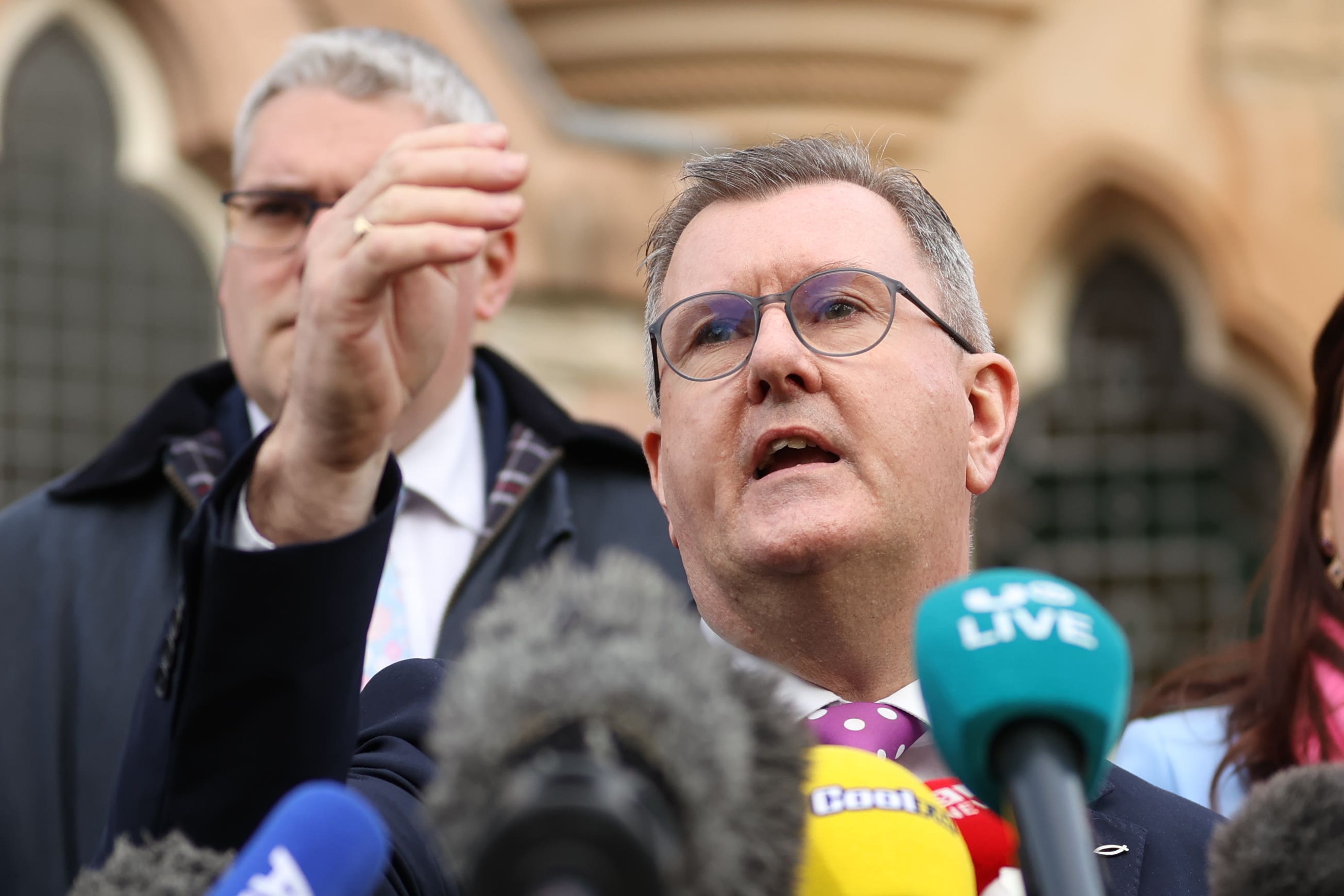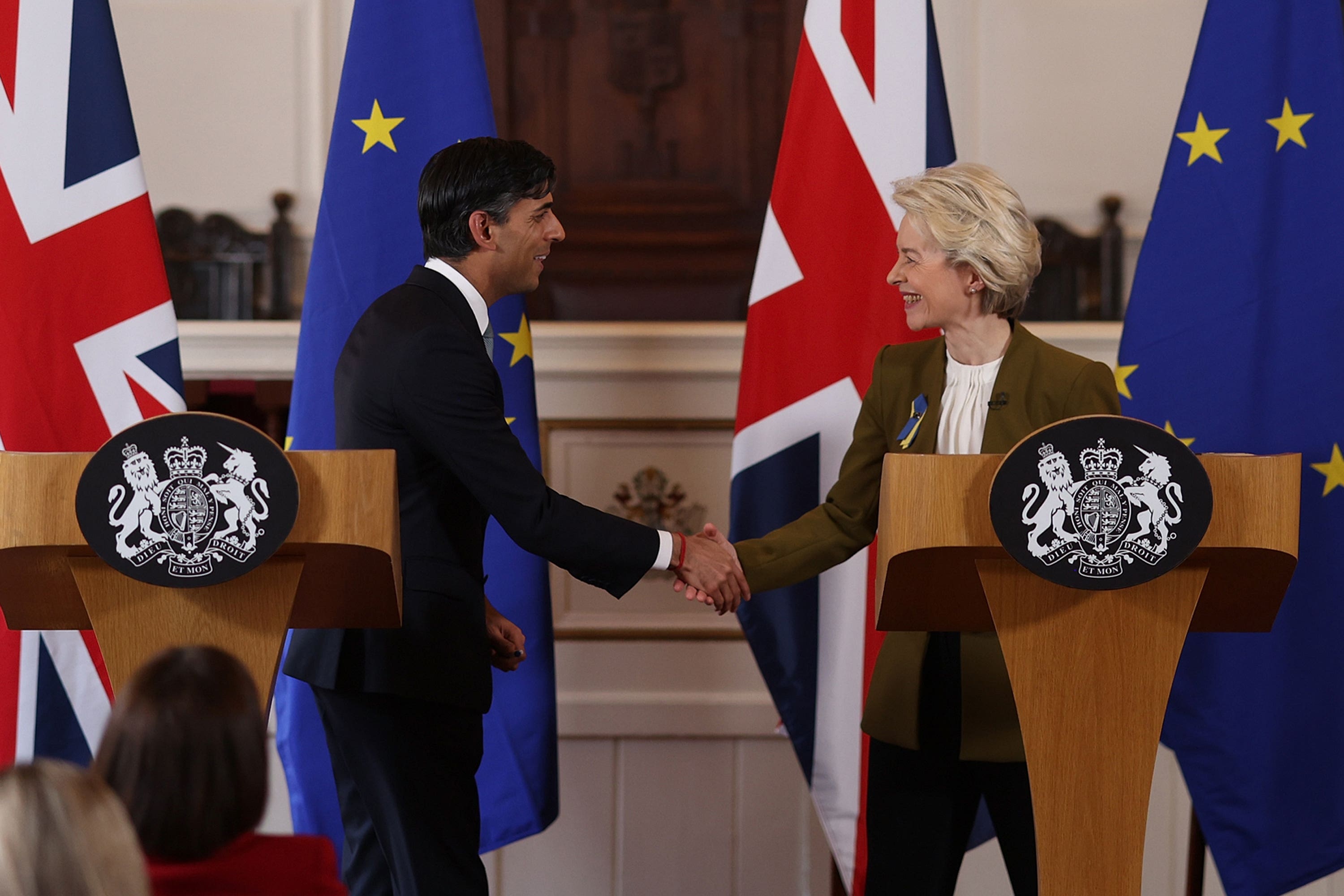Brexit: DUP to vote against Rishi Sunak’s Windsor deal
Tory hardliners in the ERG also expected to vote against compromise reached with EU
Your support helps us to tell the story
From reproductive rights to climate change to Big Tech, The Independent is on the ground when the story is developing. Whether it's investigating the financials of Elon Musk's pro-Trump PAC or producing our latest documentary, 'The A Word', which shines a light on the American women fighting for reproductive rights, we know how important it is to parse out the facts from the messaging.
At such a critical moment in US history, we need reporters on the ground. Your donation allows us to keep sending journalists to speak to both sides of the story.
The Independent is trusted by Americans across the entire political spectrum. And unlike many other quality news outlets, we choose not to lock Americans out of our reporting and analysis with paywalls. We believe quality journalism should be available to everyone, paid for by those who can afford it.
Your support makes all the difference.DUP MPs have unanimously agreed to vote against the crucial part of Rishi Sunak’s post-Brexit deal with the EU on the Northern Ireland Protocol this week in a major blow to the prime minister.
The Tory leader faces a crucial Commons vote on Wednesday on secondary legislation that would give effect to a vital part of the framework – the so-called “Stormont brake”.
The brake would allow a minority of politicians at Stormont to flag concerns about new EU laws in Northern Ireland, a move that could see the UK government veto their introduction.
But DUP leader Sir Jeffrey Donaldson said the party had decided to vote against the Stormont brake – saying the Sunak agreement does not deal with “fundamental problems” at the heart of the protocol.
Sir Jeffrey said the Stormont brake “does not deal with the fundamental issue which is the imposition of EU law by the protocol” after Monday’s meeting with colleagues.
Pointing to the unionists’ underlying concerns, he also said the brake “is not designed for, and therefore cannot apply, to the EU law which is already in place and for which no consent has been given for its application”.
The DUP is currently blocking powersharing arrangements at Stormont in protest of the protocol. Party hardliner Ian Paisley MP told the Belfast News Letter earlier on Monday: “I am categorically voting against, and I would be surprised if my colleagues do not join me.”
Mr Paisley, one of the most outspoken critics of the framework, claimed it did not pass even one of the DUP’s seven tests on the protocol.
He said Mr Sunak’s compromise was the “same old substance dressed up in a new package with a ribbon around it”, adding: “It hasn’t actually changed, or addressed the fundamental issue of Northern Ireland trade being disrupted in our internal UK market.”
While Wednesday’s vote will be a key moment, the DUP has set up a special panel to examine all the details of the Windsor Framework before the party decides whether to return to Stormont.

Tory Brexiteers in the European Research Group (ERG) have not yet offered a formal verdict on the protocol compromise, as it prepares to publish a report by its “star chamber” of lawyers on Tuesday morning.
But the ERG is widely expected to give the deal a thumbs down. The Tory hardliners will dismiss the so-called Stormont brake as “unusable”, according to The Times – warning that any block would have to be ultimately agreed by the EU.
Tory MPs in the ERG also claim that the Windsor agreement could stop the UK from diverging from Brussels’ rules because of new barriers between Britain and Northern Ireland.
Boris Johnson said earlier this month that he would find it “very difficult” to vote for the deal in parliament, while ex-cabinet minister Jacob Rees-Mogg had suggested many Brexiteer MPs would want to follow the DUP’s lead.
The PM could be forced to rely on Sir Keir Starmer’s Labour party if close to 40 Tory rebels embarrass the government by opposing the Stormont brake on Wednesday. Mr Sunak’s spokesman said No 10 believes the brake to be “the most significant element” of the UK-EU deal.

The statutory instrument on the brake was published on Monday. Although future votes on other aspects of the deal are expected, Sir Jeffrey said Wednesday’s vote will be read as “indicative” of the party’s position on the wider agreement.
The DUP leader again called for “further clarification, re-working and change” to the deal with Brussels – something Downing Street has ruled out.
Sinn Fein’s Stormont leader Michelle O’Neill said the Windsor Framework was “done”, adding: “The onus is on the British and Irish governments and all parties – not least the DUP to now get Stormont moving.”
Foreign secretary James Cleverly has announced that he will meet the EU’s Maros Sercovic in London on Friday to formally adopt the Windsor pact.
Nigel Farage, now honorary president of Reform UK, lashed out at Mr Sunak’s deal with the EU on Monday – saying Brexit has still “not been completed” by the Tory government.
He complained that Brussels regulations had “not been axed” from British statue books, and claimed the UK’s borders “are as open as they have literally ever been” despite promises to “take back control” at the Brexit referendum.





Join our commenting forum
Join thought-provoking conversations, follow other Independent readers and see their replies
Comments